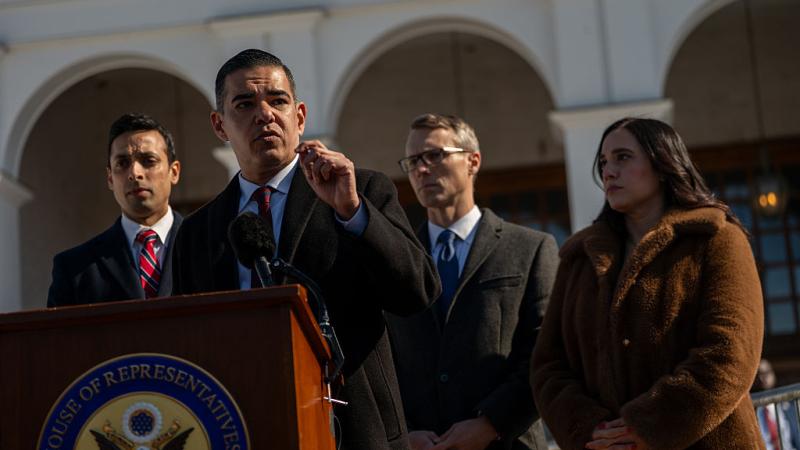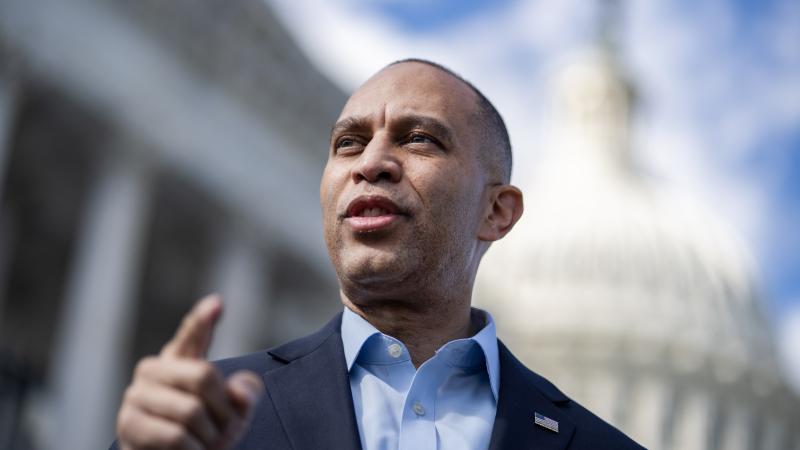Military response to Houthi attacks reopens debate on US wars, Congress' approval
Undeclared wars are not without precedent in U.S. history. Congress never formally declared war against Korea in the 1950s, Vietnam in the '60s, or against Iraq in either of the Gulf wars.
A bipartisan group of congressional lawmaker is urging the White House to stop taking what they consider overly aggressive actions against the Yemen-based Houthis – but by some measures the request may have been sent almost a decade too late.
The request came in 500-word letter Friday and centers on the U.S. military response to the Houthis' air strikes on merchant vessels in the Red Sea, in response to Israel's war on the Palestinian-affiliated militant group Hamas in Gaza.
The letter shows an unusual level of support from both sides of the aisle – a rare occasion in which the views of Republican firebrand Rep. Marjorie Taylor Greene, of Georgia, and New York Democratic Socialist Alexandria Ocasio-Cortez are in sync.
In addition, the letter expresses “serious concern regarding unauthorized military strikes” in the Red Sea, arguing that they violate the constitutional statutes that give Congress “the sole power to declare war.”
Of course, undeclared wars are not without precedent in U.S. history. Officially, Congress never formally declared war against Korea in the 1950s, Vietnam in the 1960s, or against Iraq in either of the Gulf Wars.
Should the military action against the Houthis be added to the list? Predictably, the answer is complicated.
The situation in the Red Sea dramatically intensified starting late last year, in the wake of the clash between Israel and Hamas militants in Gaza. As recently as Friday, the Houthis fired on a U.S. warship, even as the intensity of U.S. and U.K. counterattacks has intensified in recent weeks. But tensions had been simmering for a long time.
Also, on Sunday three U.S. soldiers were killed in Jordan, and dozens more were injuries, in a drone strike that President Biden said was launched by ‘radical Iran-backed militant groups,’ a term frequently used to describe the Houthis.
“We wouldn’t be talking about Yemen and the Houthis now if it wasn’t for the Israel-Hamas situation,” said Andrea Dessi, a professor of international relations at the American University of Rome and an adviser to the Institute for Foreign Affairs, a think tank. “But the roots of U.S. involvement in Yemen date back to the civil war in that country, which started in 2014.”
The Barack Obama White House began negotiating a nuclear non-proliferation deal with Iran starting in 2015, a year before it entered into force – to the great dismay of Saudi Arabia, a major U.S. trading partner. The Iranians and the Saudis are the two great rivals for supremacy in the Middle East.
That left Obama negotiators looking for a way to find a way to strike a deal with Tehran without offending Iran’s hated rivals in Riyadh, and to back Saudi Arabia without driving the Iranians from the negotiating table.
“Obama tried to find a middle ground” between the nuclear deal and informally backing the Saudi’s anti-Houthi coalition by providing “aerial re-fuelling, intelligence sharing and weapons assistance,” according to a 2018 interview with Robert Malley, who had been a top Obama’s adviser on the Middle East.
The Saudi’s deadly attacks against Yemen and the Houthis sparked concerns that they – and the U.S. as a co-belligerent – could be guilty of war crimes under international law.
The situation was further complicated after President Donald Trump pulled out of the Iran nuclear deal in 2018, again in 2022 when the Saudis and Yemen agreed to a precarious ceasefire, then when the Hamas rebels launched an attack against Israel last October.
Despite all the controversies, U.S. stance on Yemen is one of the few areas that remained steadfast starting with Obama, through the Trump administration, and into Biden’s presidency.
But is it a war?
When Sabrina Singh, deputy press secretary at the Pentagon, was asked that question point blank she categorically rejected the notion.
“No, we do not seek war,” she said. “We do not think that we are at war.”
But for Dessi and other analysts, the evidence may tell another story: “The moment the U.S. started bombing land targets in Yemen, it was a war,” Dessi said.
In the end, the situation could be playing out just as the Houthis want it to, according to some, proving that against all odds they are able to hold their own against the world’s largest military.
The Facts Inside Our Reporter's Notebook
Links
- 500-word letter
- Marjorie Taylor Greene
- Alexandria Ocasio-Cortez
- never formally declared war
- the answer is complicated
- dramatically intensified
- Houthis fired on a U.S. warship
- U.S. and U.K. counterattacks
- âradical Iran-backed militant groups,â
- Andrea Dessi
- nuclear non-proliferation deal
- to the great dismay of Saudi Arabia
- great rivals for supremacy in the Middle East
- back Saudi Arabia
- Obama tried to find a middle ground
- guilty of war crimes
- pulled out of the Iran nuclear deal
- precarious ceasefire
- Hamas rebels launched an attack against Israel
- through the Trump administration
- into Bidenâs presidency
- categorically rejected the notion
- just as the Houthis want it















